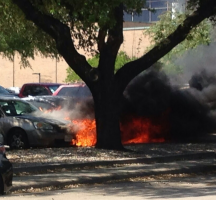
— A Hyundai and Kia engine settlement has been granted preliminary approval after the judge found the settlement was fair and adequate to owners and lessees.
The Hyundai and Kia class action lawsuit includes vehicles originally equipped with or replaced with Theta II 2-liter or 2.4-liter gasoline direct injection engines in the U.S.
- 2011-2018 and certain 2019 Hyundai Sonatas
- 2013-2018 and certain 2019 Hyundai Santa Fe Sports
- 2014-2015, 2018 and certain 2019 Hyundai Tucsons
- 2011-2018 and certain 2019 Kia Optimas
- 2011-2018 and certain 2019 Kia Sorentos
- 2011-2018 and certain 2019 Kia Sportages
For 2019 model year vehicles listed above, the vehicles are those manufactured before knock sensor detection system technology was placed into production.
According to the consolidated class action, the Hyundai and Kia vehicles are at risk of engine fires because of defects that block the flow of oil to the Theta II engines. This causes complete engine failure and owners have reported multiple fires that left only the frames.
The plaintiffs allege Hyundai and Kia concealed the engine defects and refused to perform free engine repairs. In addition, dealerships allegedly ignored complaints until the vehicles suffered serious mechanical problems necessitating expensive repairs.
Kia, Hyundai and the plaintiffs agreed to settle the lawsuit in October 2019 and announced the terms and possible benefits for owners and lessees. But with preliminary approval now granted by the judge, customers are one step closer to receiving those benefits.
Judge Josephine L. Staton says she granted preliminary approval to the settlement because the automakers and plaintiffs are aware of the expense and risk of continued litigation. Hyundai and Kia deny any liability and deny there are defects in the engines, while the plaintiffs allege the automakers committed fraud.
According to the judge, the plaintiffs may be "unable to make some of the factual showings required to succeed on the claims brought." At the same time, Hyundai/Kia will argue "they did not conceal any material information, and Defendants might otherwise successfully 'whittle down [their] overall liability' to the Class if litigation were to proceed."
Then there is the issue of time, possibly litigation that will take years, and how it "would reduce the value of consideration received by the Class as benefits of the lifetime warranty would be reduced, and vehicle ownership and service records may become harder to locate."
"The Court finds that these considerations, as well as the inherent risk of litigation, weigh in favor of granting preliminary approval." - Judge Staton
Additional details were provided by the judge concerning the engine settlement, including how Kia will hire a third-party to administer the settlement, but Hyundai plans on playing the role of settlement administrator for Hyundai vehicle owners and lessees.
An affected owner or lessee must submit a valid claim form within 90 days of the final approval order of the settlement. According to the settlement agreement, the final approval hearing is scheduled for November 13, 2020.
However, there is no such limitation on the benefits available under the lifetime warranty coverage provided for the engine short block.
Claim forms will be reviewed and within 60 days the claimant will be notified concerning the outcome of the review and the amount that will be reimbursed. If there are problems with a claim form, a customer will have 35 days to fix the errors, then the settlement administrator has 35 days to notify the customer about the final determination.
For reimbursement, the customer will be able to choose to receive a check or a debit card.
The judge says the parties haven't yet negotiated the amount that will be paid to attorneys for the plaintiffs.
The Hyundai and Kia engine settlement is taking place in the U.S. District Court for the Central District of California - In re: Kia Engine Litigation, Case No. 8:17-cv-00838.
The plaintiffs are represented by Sauder Schelkopf, The Sultzer Law Group, Walsh PLLC, and Hagens Berman Sobol Shapiro LLP.




